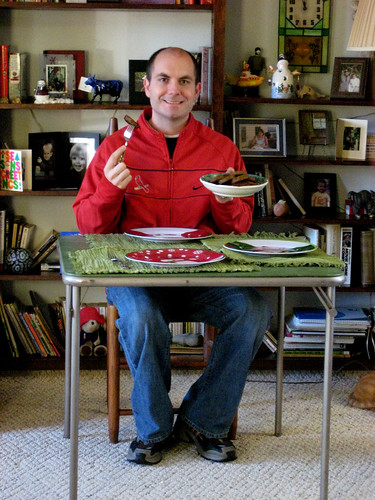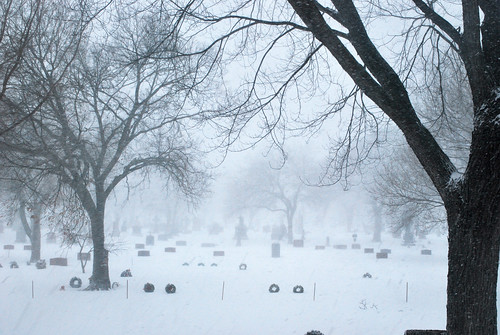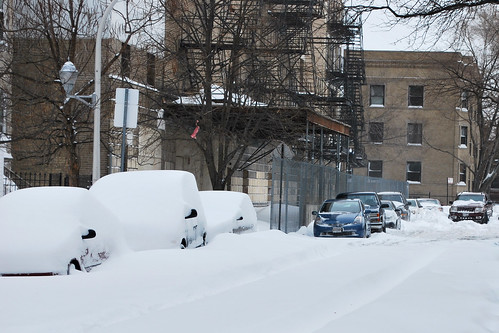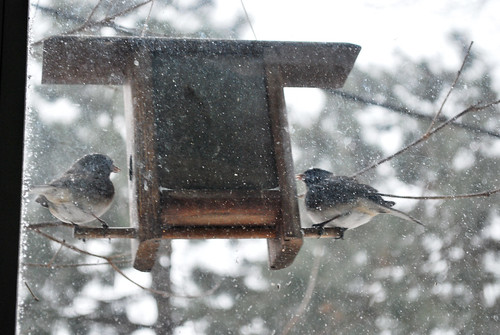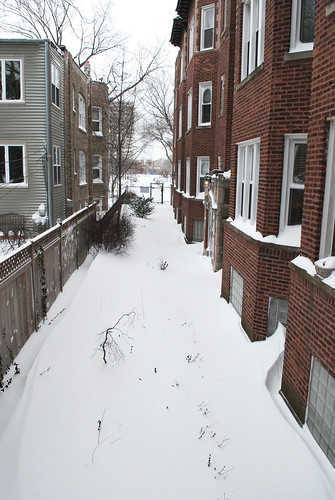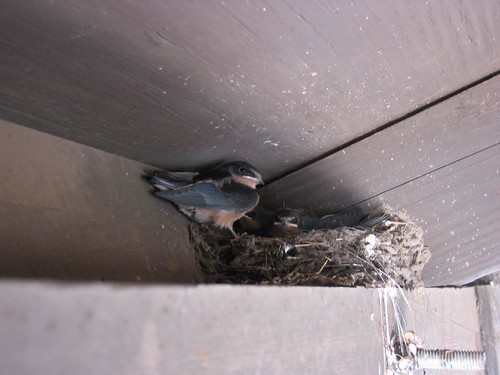I drew up a brief list of the books I most enjoyed reading this year for
Proustitute's blog that will appear laster this week. I'll tweet and post a link to it when it shows up (though until then, you could do worse than trawling through the other lists he's gathered--I've already found some promising new books that way).
Rather than rehash that list, I'll do something different here. There's no secret that my favorite publisher--other, that is, than the one that pays my salary--is New York Review of Books Classics. They take up more than half a bookcase in my library. Those shelves contain nearly as many unread books--stored away against a rainy day--as favorites, and nothing that's not at least of interest.
But which are my favorites? Which do I return to again and again? Which recommend most often? It's not an easy choice--easier than picking my favorite of our three cats, but not wildly so. Still, five it is, so here they are (with apologies to Alvaro Mutis, Rebecca West, William Dean Howells, Thomas Browne, Richard Hughes, Elizabeth Taylor, Elaine Dundy, Patrick Leigh Fermor, Felix Feneon, Raymond Kennedy, John Williams, Edith Wharton, and so many others who could have made this list).
J. F. Powers/The Stories of J. F. Powers
Powers could easily be on this list for any of the three books NYRB Classics publishes. His novels
Morte D'Urban and
Wheat That Springeth Green, especially the former, are masterpieces of thoughtful comedy, their satire pointed and effective while not carrying anything like the scorched-earth quality so often found in that form. Powers shows us human frailty, but nonetheless leaves us with belief--belief, if not always or necessarily in the god the priests he writes about purportedly serve, then at least in the value of acts of human kindness and morality.
I selected the short stories rather than the novels for the simple reason that the collection includes my two favorite pieces of Powers's writing: "A Losing Game," which may be the funniest story I've ever read (I have tried many times to read the first pages aloud to friends, and I've never gotten through it without dissolving into laughter), and, even more remarkable, its sequel, "The Presence of Grace," which within a few short pages transforms a priest whom we've seen as a figure of fun into, for one shimmering moment, an agent of grace.
Daphne Du Maurier/Don't Look Now
I first encountered Du Maurier as a child, when Robert Arthur included "The Birds" in one of the many Alfred Hitchcock-branded anthologies of suspense stories for children that he edited. I read and re-read that story, year after year, to the point where even today I know many sentences by heart--which I realized a few years back as I listened to an old radio adaptation and found myself speaking along with it.
I wrote about "The Birds"
a few years ago, and what I said about why the story affected me so deeply as a kid remains true:
Death in "The Birds," whether avian or human, is concrete and horrible. It takes something beautiful and right--a living, moving, even graceful creature--and it replaces it with a broken thing, a perversion, an object of horror. It is irreversible, and, as the tension mounts, page by page, it seems increasingly inevitable. To a child, that knowledge is as chilling as anything. I read the story again and again, knowing the bleak ending would never change.
And that's only one story! Du Maurier was a master of the tightly turning suspense story, and this collection is full of them. A few are relatively slight, but they're never less than surprising, and the best of them are genuinely creepy and strange. "The Birds" may be unshakable because of childhood, but the one that I think will stay with me as an adult is "Monte Verità," a novella-length tale of interwar rootlessness, hopeless love, and the slow erasure of the hidden places of the earth. It's a daring story with a mystical tinge, and you turn its last page feeling as if you've been returned from somewhere very far away--possibly against your will.
Robert Burton/The Anatomy of Melancholy
I came to this book through Anthony Powell, who makes his fictional stand-in in
A Dance to the Music of Time, a fan (and eventual biographer) of Burton. Powell admires the sheer surfeit of the
Anatomy's 1,200-plus pages, its cascade of endless sentences and quotations and interpolations, the sense it gives of an attempt--under the guise of delineating and explicating melancholy--to take in all of the drivers and hidden currents of human life.
I'll admit to not having read nearly all of the
Anatomy, but that doesn't keep me from wholeheartedly endorsing it in this list: it's not a book to read all of, but one to keep at your side for occasional investigation, serious or otherwise. For example, after hearing Melvyn Bragg devote an episode of his BBC radio program
In Our Time to the book, I looked (with the help of Google Books) for "news" and found a passage that, if we imagine it beaten into submission with the
AP Stylebook, could describe our media environment today:
Be content; 'tis but a nine dayes wonder; and as one sorrow drives out another, one passion another, one cloud another, one rumour is expelled by another; every day almost, come new news unto our ears, as how the sun was eclipsed, meteors seen i'th' aire, monsters born, prodigies, how the Turks were overthrown in Persia, an earth-quake in Helvetia, Calabria, Japan, or China, an inundation in Holland, a great plague in Constantinople, a fire at Prage, a dearth in Germany, such a man is made a lord, a bishop, another hanged, deposed, prest to death, for some murder, treason, rape, theft, oppression; all which we do hear at first with a kind of admiration, detestation, consternation; but by and by they are buried in silence: thy father's dead, thy brother rob'd, wife runs mad, neighbour hath kild himselfe; 'tis heavy, gastly, fearful newes at first, in every mans mouth, table talk; but, after a while, who speaks or thinks of it? It will be so with thee and thine offence: it will be forgotten in an instant, be it theft, rape, sodomy, murder, incest, treason, &c. thou art not the first offender, nor shalt thou be the last; 'tis no wonder; every houre such malefactors are called in question: nothing so common,
Even better, however, is to use the book
like the ancients used to use Virgil, as I did with my Thanksgiving post. The
sortes Burtonae rarely will divulge anything like comprehensible prophecy, but it is almost guaranteed to offer some previously unnoted gem. Let's give it a try:
We watch a sorrowful person, lest he abuse his solitariness, and so should we do a melancholy man; set him about some business, exercise, or recreation, which may divert his thoughts, and still keep him otherwise intent; for his phantasy is so restless, operative and quick, that if it be not in perpetual action, ever employed, it will work upon itself, melancholize, and be carried away instantly, with some fear, jealousy, discontent, suspicion, some vain conceit or other.
May the melancholy man be always accompanied by Burton.
J. L. Carr/A Month in the Country
This slim novel is the most haunting, and maybe the most moving, of all the NYRB Classics I've read. A young man returns from World War I and takes a job restoring a medieval mural in a country church. He sleeps out in the bell tower, surrounded by quiet--Carr makes us
feel the comforting warmth of the English summer--as each day he scrapes away just a bit more of the covering to reveal the anonymous painter's hellish vision of the apocalypse.
It's a novel about loss, and, obliquely, about war. About returning a different person to a place become different itself, and thus being rootless. About that feeling of being between--of watching days peel off the calendar pleasurably, but darkened by the endpoint you know is nearing. It's about craft, and work, and solitude, and the power of all three to transport and transform us, about what a job done well can do for the doer. And it's about the risks we court when we open our hearts, especially--as with Carr's protagonist--when we've just come from a situation that demanded we close them.
A Month in the Country is a book I return to reliably every few years. I'm rewarded each time, and I don't see that changing in the decades to come.
(Actually, this book would be worth buying solely for Michael Holroyd's introduction, which includes a bizarre, Carr-related story of a literary prize that bestows meat on its winners.)
Henry David Thoreau/The Journal, 1837-1861
This final book, like Burton's, is more one for dipping into than for reading straight through. It's not been far out of my reach at any time since it was published. Through these journals Thoreau emerges, to my mind, as more interesting, more companionable, less irritating (for, let's be honest, he can be irritating) than anywhere else. He goes about in nature, and we walk alongside, day by month by year.
Whereas Burton is best enjoyed through the index or randomness, Thoreau's journal is perhaps most fun as a regular companion, a way to peer through the years to see what this specific day, long past, was like. As I write this, Christmas approaches--and on that day in 1856 a thirty-nine-year-old Thoreau offers advice from experience
Take long walks in stormy weather, or through deeps snows in the fields and woods, if you would keep your spirits up. Deal with brute nature. Be cold and hungry and weary.
Though I will admit to having no intention of following Thoreau's advice--a seat by the Christmas tree with my family and cups of tea beckon instead--I find it bracing nonetheless. Day after day after day, he's there with you; you'll never regret it if you decide to join him on his daily wanderings.
Happy holidays, folks. Here's to another year of great reading (and perhaps even more reliable blogging? I can hope . . . )






